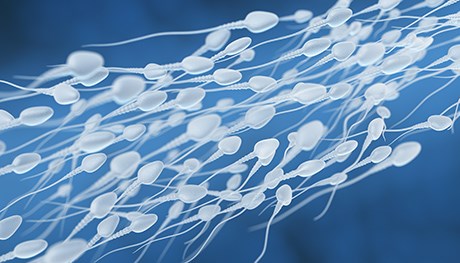
Azoospermia & general male infertility
Symptoms and diagnosis
The main symptom of male infertility is the inability to conceive a child. In some cases, however, an underlying problem such as an inherited disorder, hormonal imbalance, dilated veins around the testicle, or a condition that blocks the passage of sperm may cause signs and symptoms.
These can include problems with sexual function (difficulty in ejaculation and/or maintaining erection), pain and swelling in the testicle area, recurrent respiratory infections and decreased facial or body hair or other signs of chromosomal or hormonal abnormality.
There are various causes of male infertility, and it can occur to varying degrees.
Semen production
Some male infertility is caused by problems with semen production. Azoospermia is classed as a man having undetectable levels of sperm in his semen; it occurs in 1% of the male population and is the cause of up to 20% of infertility in couples. There are other forms of infertility which affect the sperm density to a lesser degree, as well as infertility caused by abnormal sperm mobility (making it harder for the sperm to swim to the egg) and sperm morphology (meaning that sperm are shaped abnormally and cannot fertilise the egg).
Testicular problems
There are also testicular problems which can lead to male infertility. For example, some men have undescended testicles, or testicles which have been affected by surgery, trauma, cancer or congenital defects. Sometimes the small tubes within the testicles are blocked so that the sperm do not make it into the ejaculate.
Hormonal problems
If there is a hormone imbalance or levels of testosterone are low, this can affect male fertility. Hormonal imbalances have a variety of causes such as drugs/medications, congenital disorders or tumours.
Ejaculation problems
Some men suffer from ejaculation problems, such as premature ejaculation (when ejaculation occurs too quickly) and retrograde ejaculation (when semen is ejaculated into the bladder).
Lifestyle
Sperm is produced every 3 months, so lifestyle can have a big impact on semen quality. Alcohol, cigarette and illegal drug consumption can all affect semen quality.
Choosing the right treatment for you
We are experienced at treating male infertility at our clinic, and generally do so by ICSI or sperm donation. Your suitability for either of these treatments can be assessed with a semen analysis and a scan for your partner. We also liaise with our consultant urologist who can be referred to in extremely complex cases, or where sperm aspiration is needed.
Intra-cytoplasmic sperm injection (ICSI) is a laboratory technique whereby a single sperm is injected into the egg, rather than being left in the dish to spontaneously fertilise. This means that for men with a low sperm count or sperm with abnormal morphology/mobility, a healthy looking sperm can be selected and injected directly into the egg, aiding fertilisation.
We also run a successful sperm donation process, which allows couples/single women to be matched up with an appropriate donor from our in-house sperm bank. This involves meeting with our donation co-ordinator who will help to match you with one of our donors. Alternatively we can facilitate treatment with donor sperm bought from elsewhere if requested.
If you would like more information, get in touch with our specialist advisors

